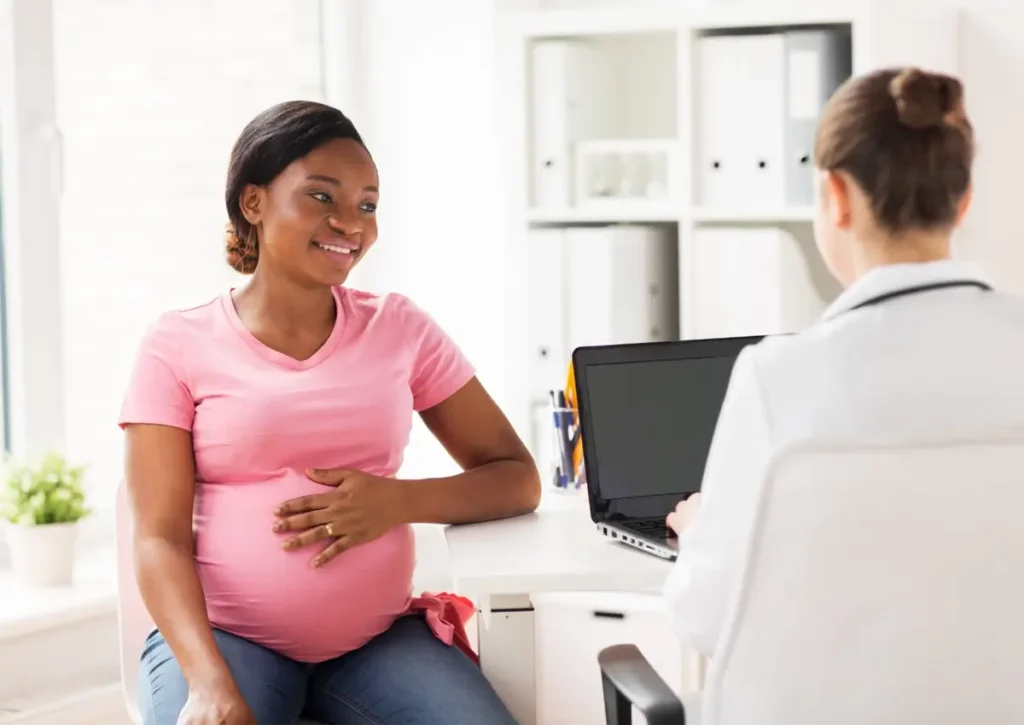Early Signs of Pregnancy & When to See a Doctor
Oct 26, 2024
Wondering if you might be pregnant? Recognizing the early signs can help you know when it’s time to take that next step. From missed periods to subtle changes in your body, these clues can be both exciting and confusing.
It’s important to understand what’s normal and when to consult a healthcare professional. Early detection not only gives you peace of mind but also ensures you and your baby get the best care from the start. Let’s dive into the telltale signs of early pregnancy and when you should schedule that all-important doctor’s visit.
Common Early Pregnancy Symptoms

Early pregnancy symptoms often vary, but some are quite common and can offer crucial early detection signals. Recognizing early signs of pregnancy is crucial for timely care. Below are some common symptoms, explained in detail.
Missed Period
Missed periods often signal pregnancy, especially if your cycles are regular. Tracking your menstrual cycle helps identify a missed period accurately. However it’s important to keep in mind, stress, diet changes, or intense exercise can also cause missed periods. Yet, if pregnancy is suspected, a missed period pregnancy test is essential for confirmation.
Nausea and Morning Sickness
Nausea and morning sickness can have many causes but the most frequent cause is due to increased hCG levels. Symptoms can start as early as the fourth week and continue into the second trimester. Managing nausea involves eating small, frequent meals, staying hydrated, and using ginger-based remedies. Morning sickness can strike at any time, so it’s important to get medical advice if nausea becomes severe.
Fatigue and Increased Tiredness
Feeling unusually tired comes from rising progesterone levels. This hormone significantly impacts your energy. Boosting your energy safely involves light exercise, drinking plenty of water, and getting adequate rest. Remember, fatigue during pregnancy is common but can be managed effectively.
Breast Changes
Breast tenderness, swelling, and sensitivity are often early pregnancy symptoms. These changes result from hormonal shifts. Unlike PMS-related changes, pregnancy-induced breast tenderness lasts longer and is more pronounced. Noticing differences in your breasts can be one of the first pregnancy signs.
Frequent Urination
Frequent urination can start as early as two to three weeks after conception. Hormones cause an increased blood flow to your kidneys causing this symptom. To manage these frequent bathroom trips, stay hydrated and plan your fluid intake.
Food Aversions or Cravings
Food cravings or aversions happen frequently in early pregnancy due to hormonal changes, especially hCG. Balancing these cravings with a healthy diet is crucial. Satisfy your cravings wisely, ensuring a nutritious intake for both you and your baby.
Mood Swings
Mood swings are another common early sign of pregnancy. Hormonal fluctuations are largely responsible. To cope, practice mindfulness, use relaxation techniques, and lean on loved ones for support. These strategies help manage the emotional ups and downs that come with pregnancy.
Less Common Early Pregnancy Symptoms

Light Spotting or Implantation Bleeding
Light spotting or implantation bleeding occurs when the fertilized egg attaches to the uterine wall. This typically lasts for one to two days. Spotting often appears lighter in color than a regular period, usually pink or brown. You’ll notice the texture is different, often less viscous compared to menstrual blood. Don’t confuse spotting with a missed period; the latter is a more traditional indicator of pregnancy. If you experience continuous or heavy bleeding, consider when to see a doctor for further evaluation. Understanding the difference between spotting and a regular period can help you identify early signs of pregnancy accurately.
Headaches and Dizziness
Changes in hormones and increased blood volume during early pregnancy may lead to headaches and dizziness. These symptoms can occur at any time and vary in intensity. Staying hydrated and getting enough rest can alleviate some of these discomforts. Safe remedies for managing headaches include over-the-counter medications approved by your healthcare provider. For dizziness, consider sitting or lying down until it passes. High levels of progesterone and other hormonal changes can impact your overall well-being, making it essential to monitor your symptoms. Persistent or severe headaches may require medical attention.
Constipation and Digestive Changes
Pregnancy often affects digestion due to higher progesterone levels, leading to constipation. The slowing of your digestive system can cause discomfort and bloating. Eating high-fiber foods like fruits, vegetables, and whole grains can ease constipation. Drink plenty of water to keep your system hydrated, and engage in regular exercise to stimulate digestion. If natural remedies aren’t effective, discuss safe options with your healthcare provider. Digestive changes may be one of the less common early pregnancy symptoms, yet they significantly impact your daily routine.
When to Take a Pregnancy Test

Understanding when to take a pregnancy test can help confirm your symptoms. Typical symptoms like morning sickness, nausea, and fatigue during pregnancy usually emerge one to two weeks after conception.
Hormones, such as hCG and progesterone, play a pivotal role in causing early symptoms. Elevated levels of hCG can cause nausea and vomiting, commonly known as morning sickness.
Most women start experiencing early pregnancy symptoms like breast tenderness and frequent urination about one to two weeks after conception. If you’re feeling unusually fatigued or notice breast tenderness, it may be time to consider taking a pregnancy test.
Paying attention to these early symptoms and understanding the timing can give you the information needed to seek appropriate medical attention.
When to See a Doctor

After noticing early signs of pregnancy such as a missed period or morning sickness, you should confirm your pregnancy with a healthcare provider. Schedule an appointment right after your missed period pregnancy test. Early pregnancy care becomes crucial at this stage.
During your first prenatal visit, expect confirmation of the pregnancy, a comprehensive physical exam, and a review of your health history. This initial consultation sets the foundation for your pregnancy health tips and care plan. It helps identify any risk factors or existing conditions that could affect your pregnancy.
Symptoms That Require Immediate Medical Attention
Mild cramping is a common occurrence during early pregnancy. However, if you experience severe cramping or bleeding, it’s essential to see a doctor immediately. These symptoms could indicate a problem requiring swift medical intervention.
Dizziness is another symptom to monitor closely. Although occasional dizziness is typically harmless, fainting spells or extreme dizziness coupled with shortness of breath might suggest complications. Promptly consult your healthcare provider if these symptoms arise.
Discussing Concerns with Your Doctor
When preparing for your first prenatal checkup, compile a list of symptoms and concerns to discuss. This list might include pregnancy symptoms like breast tenderness and frequent urination, as well as specific instances of your experience.
Key questions to ask your doctor should cover safe dietary habits, the impact of any current medications, and effective ways to manage common symptoms like fatigue during pregnancy. Clarifying these aspects helps ensure a healthier pregnancy journey and prepares you better for the upcoming months.
Monitor, Track, and Setting Up Your Prenatal Visit
Recognizing early signs of pregnancy can be both exciting and overwhelming, but you don’t have to navigate it alone. At HealthCore Clinic, we’re here to support you every step of the way. Monitoring and tracking your symptoms is essential, but having a trusted healthcare partner is even more important for ensuring both your health and your baby’s development.
If you’ve noticed any early pregnancy signs, don’t wait. Take a home pregnancy test and schedule your appointment with HealthCore Clinic today. Our team of compassionate providers is ready to confirm your pregnancy and guide you through a personalized prenatal care plan that puts you and your baby first.
Your first prenatal visit is a crucial opportunity to ask questions, address any concerns, and create a roadmap for a healthy pregnancy. At HealthCore Clinic, we’ll ensure you feel informed, empowered, and confident about your pregnancy journey. Plus, if you experience any severe symptoms like heavy bleeding or cramping, you can count on us for immediate and expert care.
Take charge of your pregnancy with the dedicated support of HealthCore Clinic. Schedule your appointment today, and let’s embark on this beautiful journey together.
Frequently Asked Questions

What are the early signs of pregnancy
Common early signs of pregnancy include missed periods, morning sickness, nausea, breast changes, frequent urination, fatigue, and mood swings. These symptoms are due to hormonal changes in the body.
When should I take a pregnancy test after noticing early signs?
It’s best to take a pregnancy test after missing a period. Testing too early may result in a false negative. Early morning urine typically contains the highest concentration of hCG hormone, enhancing test accuracy.
How soon should I see a doctor if I suspect I’m pregnant?
Schedule a visit with your healthcare provider as soon as you suspect pregnancy, ideally around eight weeks after your last menstrual period, to start prenatal care.
What should I expect during my first prenatal visit?
During the first prenatal visit, your provider will perform a physical exam, review your health history, draw blood for tests, and discuss a care plan. This visit establishes the foundation for a healthy pregnancy.
What is considered normal during early pregnancy?
Normal early pregnancy symptoms include missed periods, nausea, breast tenderness, mood swings, and fatigue. Each woman’s experience is unique, so symptoms may vary.
When should I seek medical advice for early pregnancy symptoms?
Seek medical advice if you experience severe cramping, heavy bleeding, dizziness, or fainting. These symptoms could indicate complications that require immediate attention.
How can I manage nausea and morning sickness?
To manage nausea and morning sickness, eat small, frequent meals, avoid strong odors, stay hydrated, and try ginger or acupressure wristbands. Consult your doctor for additional recommendations if needed.
What causes fatigue in early pregnancy?
Fatigue in early pregnancy is usually caused by rising progesterone levels. It can help to get plenty of rest, eat a balanced diet, and remain hydrated to manage energy levels.
Are breast changes a common early pregnancy sign?
Yes, breast changes such as tenderness, swelling, or darkening of the areolas are common due to hormonal shifts. These changes prepare your breasts for lactation.
What should I do if I experience light spotting during early pregnancy?
Light spotting can be normal and may be due to implantation bleeding. However, consult your healthcare provider to rule out any complications, especially if spotting is heavy or accompanied by severe cramping.